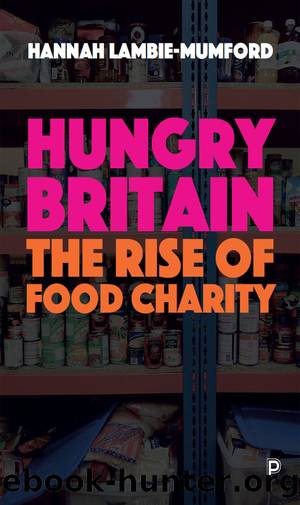Hungry Britain by Lambie-Mumford Hannah

Author:Lambie-Mumford, Hannah [Lambie-Mumford, Hannah]
Language: eng
Format: epub
Tags: Social Science, Agriculture & Food
ISBN: 9781447328322
Google: KBgwDwAAQBAJ
Publisher: Policy Press
Published: 2017-07-05T04:32:06+00:00
The impact of partnerships on ways of working
The findings suggest that the case study organisations take strategic approaches to securing and managing partnership relations, and that they may wield particular power in negotiating these due to the current high public profile of hunger and food banking. However, other data collected raises questions about the power dynamics of these relationships in practice â how tailored they are to the needs of the organisations, and the ways in which knock-on effects may be shaping the organisations in unforeseen or unintended ways. In the case of FareShare, the introduction of food drives to incentivise retail partners is explored; in the case of the Foodbank Network, the ways in which amounts collected at food drives is making them rethink ways of working are discussed.
FareShare began doing food drives (first at Sainsburyâs, then at Tesco) as an integral part of their relationship with these retailers. However, this has caused tension among some involved with depots, who feel that food drives undermine their waste message:
FareShare was fundamentally set up to avoid waste. It was there to deal with surplus. It was not there to do food collections at Sainsburyâs and to take food that wasnât waste. (FareShare National Trustee and Trustee of FareShare South West)
A good example of where they [FareShareâs aims] come into conflict would be, for example, doing a food drive with Sainsburyâs or Tesco, where the general public are being asked to donate a product, because thatâs not surplus. However, what that does is enable us to align our brand to retailers in a public way, to their consumers, which has a transformational effect on the supply chainâs view and attitude of us. So the ends justify the means in terms of making surpluses [more accessible], and building relationships. (FareShare CEO)
Data from the Trussell Trust Foodbank Network highlights one main area in which corporate partnerships may have influenced decisions to enter into different territory: the receipt of surplus food and product donated in bulk (though not necessarily surplus) directly from manufacturers (see donations from Kelloggâs detailed in CEBR, 2013).
The impact of partnership power dynamics on the agency of the case study organisations in their future planning is interesting to note here as well. Interviewees touched on the ways in which partnerships with the food industry in particular are likely to have considerable impact. The Trussell Trust, for example, is rethinking ways of working in response to the volume of food being collected at retail partnersâ food drives:
On the side of life with the likes of Tesco and whatnot, it may change our strategic thinking. This has always been a charity that franchises and sets up a local food bank. We are now thinking, and we are only thinking but I am going to say it anyway: âDo we set logistical hubs up throughout the country?â If we decide to collect from supermarkets, the food could be stored where local charities, not just food banks, could draw down food. It has already been donated by the public.
Download
This site does not store any files on its server. We only index and link to content provided by other sites. Please contact the content providers to delete copyright contents if any and email us, we'll remove relevant links or contents immediately.
Craft Beer for the Homebrewer by Michael Agnew(18233)
Marijuana Grower's Handbook by Ed Rosenthal(3675)
Barkskins by Annie Proulx(3364)
Project Animal Farm: An Accidental Journey into the Secret World of Farming and the Truth About Our Food by Sonia Faruqi(3212)
The Plant Messiah by Carlos Magdalena(2921)
Red Famine: Stalin's War on Ukraine by Anne Applebaum(2921)
0041152001443424520 .pdf by Unknown(2843)
Organic Mushroom Farming and Mycoremediation by Tradd Cotter(2684)
In the Woods by Tana French(2581)
Beer is proof God loves us by Charles W. Bamforth(2450)
7-14 Days by Noah Waters(2409)
Between Two Fires by Christopher Buehlman(2303)
Borders by unknow(2301)
Reservoir 13 by Jon McGregor(2300)
Meathooked by Marta Zaraska(2255)
The Art of Making Gelato by Morgan Morano(2251)
Birds, Beasts and Relatives by Gerald Durrell(2215)
The 7 Habits of Highly Effective People: Powerful Lessons in Personal Change (25th Anniversary Edition) by Covey Stephen R(2188)
The Lean Farm Guide to Growing Vegetables: More In-Depth Lean Techniques for Efficient Organic Production by Ben Hartman(2125)
